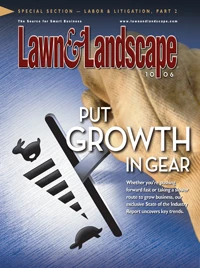Uniformed employees can be important to any landscape or lawn care business.
In residential neighborhoods and in business parks and campuses, uniforms allow landscape companies to differentiate their personnel from their competitors, convey a solid business identity and image as well as promote company loyalty among workers. It’s a trend seen across industries, according to the Uniform & Textile & Service Association. As many as 33 million people wear uniforms to work, according to UTSA research, and the number of uniform-wearing workers increases by about 1.2 million each year. The USTA estimates that the total potential market of uniform wearers is 84 to 88 million people, or three times the current number.
Lawn & Landscape Message Board participants recently debated the merits of uniforms and their impact on business, as well as what was appropriate protocol in terms of uniform purchasing and maintenance.
BUY OR PROVIDE? One of the questions at the forefront of the uniform debate came from landscape contractors who were considering uniforms but were uncertain about whether to make employees pay for them.
Uniforms are an important business component, posts Bob Keating, president of Liberty Land Management in Palm Harbor, Fla. He supplies laborers with T-shirts and managers with dress shirts.
“Shirts are mandatory and everyone knows not to show up without them,” Keating says. “We do not charge for the first five shirts. After that it is $5 per shirt. There’s no charge for a shirt that goes through normal wear and tear.
“Managers get 10 dress shirts at no charge,” Keating adds. “They pick the color and are responsible for dry cleaning bills.”
“I buy them,” posts Jamie Bush, president of Jamie’s Lawn Service in Plano, Texas. “But if you can get them to spring for them, go for it.”
Andrew Aksar, president of Outdoor Finishes in Walkersville, Md., believes in the importance of uniformed employees. His workers are required to wear company T-shirts and he does not charge them. “To me, charging is not good,” he posts. “It’s my business. I decide I wanted them to wear uniforms. It’s the cost of doing business. Therefore, the company pays for it. Landscape workers do not make glamorous wages. Providing uniforms and company shirts is part of their pay.”
In order to save money, some contrators post suggestions to purchase polo-style shirts in bulk from department stores when the apparel goes on sale, which can ensure color consistency and quality material. Company logos can be stitched on at a later date, and often for a small fee.
Other contractors posted they were in favor of defraying the cost of uniforms onto their workers.
Quit or fired, Todd McCabe says his employees must return their shirts or they are charged $25 per shirt. He has also found success employing a uniform service. “We use a uniform service that provides the uniforms and cleans them as well,” says the president of McCabe Landscape Group, based in Wrightsville Beach, N.C. “We deduct about half of the cost of the service from each check. The employees seem to like this and we have never met any resistance from them.”
Other contractors post that it is not unreasonable to either charge or deduct the cost of lost uniforms or clothing that has experienced “unreasonable” wear-and-tear.
Andy Novelli of Four Seasons Landscape in Washington, Pa., says his company tried a uniform service but the shirts were too hot and they gave his workers a rash, even though the provider had used anti-allergenic cleaning agents. Now he provides laborers with T-shirts and gives hooded sweatshirts to his foremen.
MORE THAN BRANDING. Bill Smallwood, owner of W.J. Smallwood Landscaping in Salem N.H., disagrees with his Message Board colleagues and posts he doesn’t see the need for uniforms or company T-shirts. He cited studies about why people chose their lawn service provider and uniformed employees garnered only about 3 percent of the responses. “Seems like a waste of money to me,” he posts. “Make sure your employees are trained properly and thoroughly, are courteous to your clients and meet or exceed expectations. This will distance you from your competition, not what is on the T-shirt.”
Ryan Holt, who provides employees with company shirts at his expense, counters that uniform benefits far outweigh the minimal financial cost to a landscape contractor.
“It’s not necessarily for the customer,” he posts. “It makes everyone feel like they are on the same team. And there is no argument as to what looks better: a crew dressed the same or a bunch of guys wearing all different shirts?
“Think of it this way, you’re playing softball and what team looks better, the team who is all wearing the same uniform or the team that is mixed and matched?” Holt continues. “Even though the team without uniforms might be better, just going on looks you would probably favor the team with uniforms.”
IMPORTANT TOOLS. In some respects, uniforms can be just as important of a tool to a landscape firm as a zero-turning radius mower or a string trimmer.
In some previous posts, landscape contractors view uniforms as not only projecting a positive image, but also as an extension of both the owner and the company’s professional principles and quality-oriented ideals.
“Uniforms give us a professional edge over the guys in holey shirts or no shirts, or even mismatched colors or clothing with possibly offensive writing,” posts Melissa Brodsky, owner of Honeybee Landscaping in Grafton, W.Va. “It makes me very proud to see my company name on the guys. It’s cheap advertising, too.”

Explore the October 2006 Issue
Check out more from this issue and find your next story to read.





